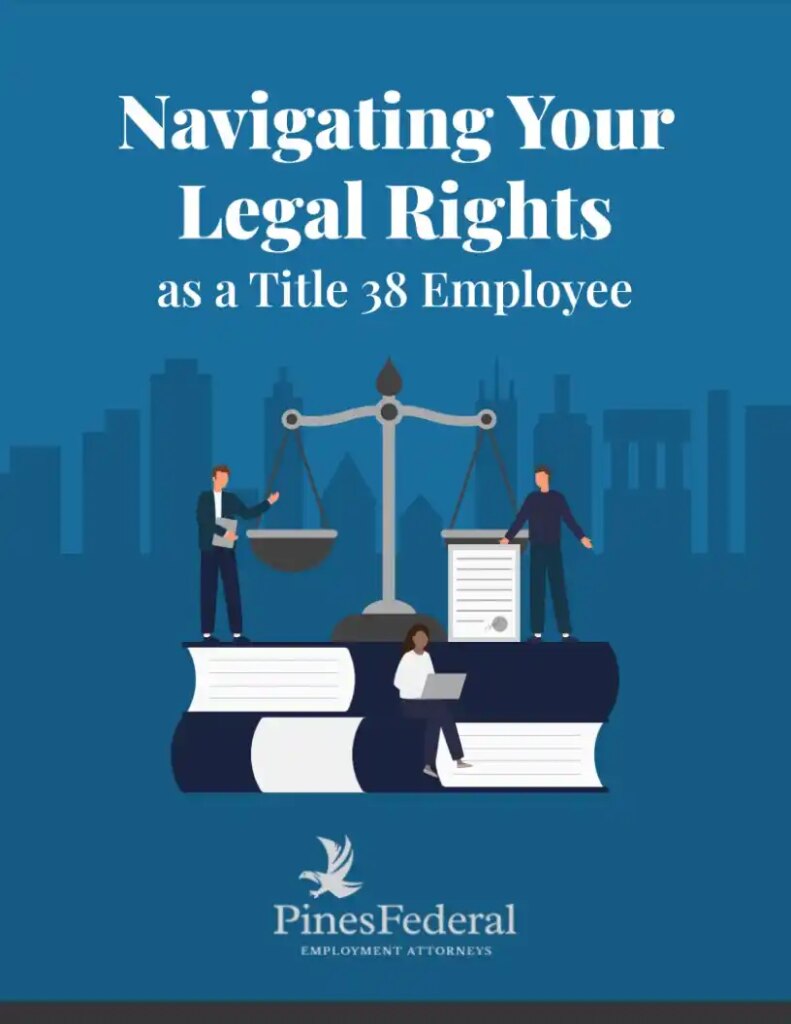Know Your Legal Rights as a Title 38 Employee
We pride ourselves on understanding the unique legal landscape and rights for VA Doctors and Nurses.
Are you employed by the Veterans Administration as a physician, dentist, podiatrist, optometrist, nurse, nurse anesthetist, physician assistant, or an expanded-function dental auxiliary (EFDA)? If so, you are a Title 38 employee. As a Title 38 employee, you do not have the same rights as a typical federal employee.
Title 38 employees have to go through a different legal process if they want to appeal unjust disciplinary actions. Since Title 38 employees can’t take their cases to the Merit Systems Protection Board (MSPB), federal employers like the VA have more discretion over disciplinary actions.
That is why it is crucial to hire an experienced federal employment attorney to handle your case if you believe your career is at risk due to actions taken by the VA.
A skilled Title 38 lawyer can walk you through your case and build a strong legal strategy to fight the following adverse employer actions:
- Unjust job transfer
- Race, gender, age, or disability discrimination
- Unjust suspension, demotion, or termination
- Whistleblower retaliation
At Pines Federal, we help you understand the specific laws that apply to your profession, counseling you as your reputable VA federal employee attorneys.
We are committed to using our extensive resources and knowledge of the law to fight for the rights of our clients, whether it’s obtaining injunctive relief to stop adverse action or expunging your professional files after you were unlawfully disciplined.
However, if you want to successfully file a claim against a federal employer, you will need to properly file paperwork and meet crucial deadlines that are much shorter than the deadlines for private-sector employees.
This can be an overwhelming process if you don’t have a legal background, which is why you should immediately consult with our lawyers to discuss the details of your situation.
Call (800) 801-0598 or send us an online message today to schedule a consultation.
What Makes a Title 38 Employee Different?
The vast majority of federal government employees are covered by Title 5 of the United States Code. Title 5 is responsible for setting all the unique benefits of federal employment.
Matters covered by Title 5 include the general working conditions for employees, the two pay scales (General Schedule (GS) and Executive Schedule (ES)), and which days are federal holidays. Yet not all employees fall under Title 5. Some employees in medical settings fall under US Code Title 38.
In general, Title 38 employees are medical or health care providers who work at the VA or National Institutes of Health (NIH) and are appointed under Title 38 of the US Code. Employment laws for Title 38 employees are specific to your profession.
As a Title 38 VA employee, you are treated differently than other federal workers regarding appeals over discipline, pay issues or other adverse personnel decisions, including discriminatory practices.
Examples of Title 38 employees include:
- Physicians
- Dentists
- Chiropractors
- Podiatrists
- Optometrists
- Registered nurses
- Physician assistants
Pines Federal spends an extensive amount of time providing careful counsel for individuals whose professions fall under the umbrella of Title 38, particularly because of the peculiar nature of the laws that apply to this category of federal employee.
For example, if you are suspended over 14 days you cannot seek recourse through the MSPB like a typical federal employee; instead you must go through “Boards.” Another difference is that Title 38 employees serve a 2-year probationary period rather than the usual 1-year period.
Other unique laws and requirements for Title 38 employees include:
- Having staff appointments and privileges handled through a Professional Standards Board.
- Adverse personnel action appeals are not directed to the MSPB but to the Medical Center Director or to federal district court.
- Appeals regarding personnel matters may be handled through a Title V collective bargaining agreement.
Because not all federal employment attorneys work with Title 38 employees, it is important to consult a Title 38 employment lawyer if you fall into this employment category.
Featured Case Result
WHAT HAPPENED: A VA doctor was disciplined because the agency claimed the client spent more time with patient care instead of administrative tasks. We were able to save the VA doctor’s position and rescinded all adverse actions.
Title 38 Differences in Pay and Working Conditions
As you probably already know, virtually Title 5 employees work 40 hours per week. Title 5 employees also work during normal business hours from Monday through Friday. However, quite a few Title 38 employees are required to be available 24/7.
One shared trait between Title 38 and Title 5 positions is that both can be part-time or full-time. Both Title 5 and Title 38 positions can also be intermittent or temporary.
How Do I Know If I Am a Title 38 Federal Employee?
If you fall into one of the professions we just listed above, then you are likely a Title 38 Federal Employee. However, several additional professions include both Title 38 employees and traditional Title 5 employees.
Those mixed professions— also called “Title 38 hybrid” professions—include:
- Biomedical engineers;
- Audiologists and audiologist technologists;
- Marriage and family therapists;
- Dental hygienists, dental technicians, and dental assistants;
- Respiratory and physical therapists;
- Pharmacists and pharmacy technicians;
- Registered dietitians;
- Blind rehabilitation specialists;
- Occupational therapists and occupational therapy assistants;
- Professional mental health counselors; and
- Biologists, chemists, and physicists.
There are other mixed professions out there as well. It’s vital you understand whether you are a Title 5 or Title 38 employee. If you still have questions about your employment category, contact a lawyer for Title 38 employees.
What Legal Rights Do Title 38 Federal Employees Have?
Many of the legal protections that belong to Title 5 federal employees do not apply to Title 38 federal employees. As we mentioned before, these missing rights include the right to appeal to the Merit Systems Protection Board (MSPB). Yet many other federal protections apply to Title 38 employees, including:
- The Administrative Procedures Act (APA). This law allows courts to annul or overturn any agency actions that are arbitrary and capricious.
- Title VII of the Civil Rights Act of 1964. The cornerstone of federal anti-discrimination laws, Title VII prohibits federal employers from discriminating against or harassing employees on the basis of their color, national origin, religion, sex, gender, or religion.
- Rehabilitation Act of 1973. The Rehabilitation Act adds to the protections of Title VII by prohibiting discrimination based on disability in the federal workplace.
- Age Discrimination in Employment Act (ADEA). This act outlaws any age-based discrimination in the workplace against those employees who are 40 or older.
- The Whistleblower Protection Act (WPA). The WPA prohibits federal agencies (including the VA and NIH) from retaliating against employees who report wrongdoing.
[DOWNLOAD] Legal Rights for Title 38 Employees

Administrative Investigations Boards
If you are disciplined as a Title 38 federal employee, the agency will usually conduct an Administrative Investigation Board (AIB).
This Board will usually consist of your peers. It will meet and interview people and gather evidence. It is essential to have our VA federal employee Title 38 attorney present during the AIB in order to assist you with protecting your rights.
The AIB could be the beginning of a suspension as a disciplinary action, a report to your licensing board, or even termination. Thus, retaining a lawyer for Title 38 employees could potentially save your career.
At Pines Federal, we have a specific talent for representing VA employees before the AIB. On a number of occasions our federal employee attorneys have successfully assisted VA employees and have had all charges brought against them withdrawn.
Disciplinary Appeals Board Hearings
Should you end up with a negative assessment for the AIB finding, you have the right to appear before a Disciplinary Appeals Board (DAB) in order to make your case. The DAB hearing is held like a formal legal hearing, and legal representation is essential.
A Disciplinary Appeals Board is part of the Title 38 remedial process used for appealing disciplinary issues to the:
- Medical Center Director
- United States Court of Appeals for the Federal Circuit for major adverse actions involving a question of professional competency or conduct
The Disciplinary Appeals Board is also for appeals of other adverse actions through various administrative procedures provided by regulation or to appeal personnel actions through a Title 5 collective bargaining agreement.
When your future employment depends on a DAB, retain the services of our experienced legal counsel for the best possible results. With decades of combined experience, our team has served federal employees nationwide. Let us guide you through your DAB hearing now.
How an Experienced Title 38 Lawyer Can Help You
Many people are reluctant to hire an attorney, even if they are dealing with a legal issue as obscure as a Title 38 DAB. Yet an attorney can bring you a wide variety of benefits.
For one, a Title 38 attorney can help you spot the relevant legal issues at play in your case and apply the law on your behalf. Quite often, multiple issues are going on simultaneously in just one person’s case. Having an expert who can separate the various issues and handle them one at a time is vital to success
For instance, a federal employee may be facing a DAB because of performance shortcomings that are caused by a disability. A Title 38 attorney will be able to encourage the employee to apply for a reasonable accommodation so that management is aware of the employee’s medical condition and can give the assistance they are owed under the law.
Second, a federal employment lawyer can navigate the complicated and nuanced language of federal regulations to your advantage.
Finally, an attorney can help you meet all deadlines during a legal proceeding; this is a critical advantage because deadlines are often narrow and wrapped in obscure language that can confuse even the most capable federal employee.
Consult a Qualified Title 38 Lawyer Today for Assistance
Are you ready to take legal action against your federal employer? Then reach out to our law firm today to speak to one of our seasoned Title 38 lawyers about your case.
Our legal team is here to provide you with the dedicated and compassionate representation you need to navigate your case and ensure your rights are protected each step of the way. Our goal is to help you understand the laws impacting your case and to give you an honest assessment of your claims.
We know how important your career is to you, and we are prepared to provide you with the top-notch legal counsel you need to secure the justice you deserve.
Request a consultation today by calling our Nationwide federal employee attorneys at (800) 801-0598.





